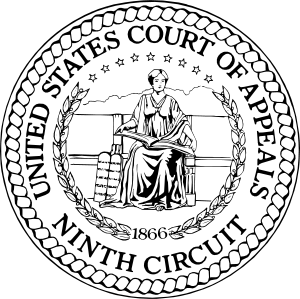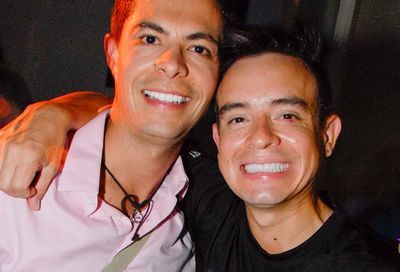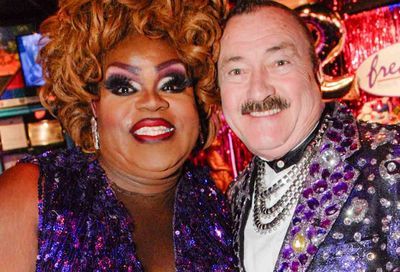The Prop 8 Ninth Circuit Panel: A Trio of Judges Worthy of Note
The U.S. Court of Appeals for the Ninth Circuit today announced the panel of judges who will be hearing next week’s appeals, which includes the appeal of Perry v. Schwarzenegger, the challenge to California’s Proposition 8 (discussed here earlier today). Those hearing the Dec. 6 Perry arguments will be Judges Stephen Reinhardt, a Carter appointee known for being one of the most unabashedly liberal of judges in the appellate courts; Michael Daly Hawkins, President Clinton’s first nominee to the Ninth Circuit; and N. Randy Smith, a conservative Bush appointee who attended Brigham Young University for both undergraduate and law school education.
 In a 2009 matter regarding health-insurance benefits sought by a federal public defender legally married in California to his same-sex spouse, Reinhardt found that the application of the Defense of Marriage Act to limit the provision of those benefits to Brad Levenson for his husband would be unconstitutional because “there is no rational basis for denying benefits to the same-sex spouses of FPD employees while granting them to opposite-sex spouses of FPD employees.”
In a 2009 matter regarding health-insurance benefits sought by a federal public defender legally married in California to his same-sex spouse, Reinhardt found that the application of the Defense of Marriage Act to limit the provision of those benefits to Brad Levenson for his husband would be unconstitutional because “there is no rational basis for denying benefits to the same-sex spouses of FPD employees while granting them to opposite-sex spouses of FPD employees.”
Reinhardt went on:
The denial of federal benefits to same-sex spouses cannot be justified simply by a distaste for or disapproval of same-sex marriage or a desire to deprive same-sex spouses of benefits available to other spouses in order to discourage them from exercising a legal right afforded them by a state.
While noting in his order that marriage is “a fundamental right,” however, Reinhardt pointed out that the matter before him was not the question of “[w]hether a state may deny such status to same-sex couples” because the couple in question was legally married and only challenging the denial of federal benefits.
Smith is a Republican who previously served as the head of the Idaho Republican Party. His biography presented by the Bush administration upon his nomination did not state his religious affiliation but did note, “Judge Smith has served as a lay leader in his church, and he and his wife are involved in community and church activities.” Several other articles suggest that Smith is a Mormon. Metro Weekly attempted to confirm this information with the Ninth Circuit but was unsuccessful in doing so on Monday.
Such information would serve as a counterpoint to earlier protestations by the National Organization for Marriage and others about the trial court judge in the case, U.S. District Court Judge Vaughn Walker, who the San Francisco Chronicle reported is gay.
The Family Research Council, after Walker’s Aug. 4 ruling, mentioned in its Washington Update that Walker had been reported to be gay, then stated:
It turns out that the Judge behind Proposition 8’s undoing was just biding his time until he could unleash his ultimate agenda: decimating marriages that have defined civilization since the beginning of time. Despite Walker ‘s own biases, which are woven into all 136 pages of the court’s opinion, protecting marriage is not discriminatory. Nor is it, as he mocked, an “artifact” rooted in “unfounded stereotypes and prejudices.” The right to marry is granted by the U.S. Constitution — but not the right to redefine marriage.
The significant involvement of the the Mormon church in supporting Proposition 8 already has led some opponents of Proposition 8 to raise similar questions about Smith.
The final judge on the panel, Hawkins, was one of the three judges on the earlier three-judge panel that granted the stay of Walker’s decision pending the appeal. (The other two included a Reagan appointee, Judge Edward Leavy, and another Clinton appointee, Judge Sidney Thomas, who was considered for Justice Stevens’s Supreme Court seat.) He is a former Marine who served as the U.S. Attorney in Arizona during the Carter administration and took senior status earlier this year. When answering Howard Bashman’s “20 Questions” at How Appealing, he wrote:
I think of myself as being entirely moderate in all things, but others might say otherwise. My judicial philosophy is really pretty simple: people involved in the legal process should be treated fairly and judges should decide cases on the merits.
As such, it is likely that the questions to come before the panel could quite likely come down to the way that this self-defined “moderate in all things” judge views them.
Among the questions that will need to be answered by the judges are whether the Proposition 8 proponents have standing to bring the appeal; whether Imperial County should have been allowed to intervene in the case and now have standing to appeal the Aug. 4 ruling; whether, if a party does have standing to bring the appeal, Walker was right that Proposition 8 violates the constitutional guarantees of equal protection and due process; and whether, if no party has standing to bring the appeal, there even was standing at the district court level for Walker to have heard the case.
With Reinhardt likely to be looking for a way to affirm the ruling and Smith likely to be looking for a way to overturn it, the complexity of the standing questions could give Hawkins significant sway over the specific outcome that the court might reach to dispose of the case.
Once the three-judge panel hears the case and later rules, any party dissatisfied with the ruling could seek en banc review, which would require all the active Ninth Circuit judges to vote whether en banc consideration will be given. If a majority supports en banc consideration, then the chief judge of the circuit, Judge Alex Kozinski, and 10 randomly selected appellate judges from the circuit will hear the en banc appeal. Further review by the Ninth Circuit or a request to the Supreme Court to hear the case could follow.
Support Metro Weekly’s Journalism
These are challenging times for news organizations. And yet it’s crucial we stay active and provide vital resources and information to both our local readers and the world. So won’t you please take a moment and consider supporting Metro Weekly with a membership? For as little as $5 a month, you can help ensure Metro Weekly magazine and MetroWeekly.com remain free, viable resources as we provide the best, most diverse, culturally-resonant LGBTQ coverage in both the D.C. region and around the world. Memberships come with exclusive perks and discounts, your own personal digital delivery of each week’s magazine (and an archive), access to our Member's Lounge when it launches this fall, and exclusive members-only items like Metro Weekly Membership Mugs and Tote Bags! Check out all our membership levels here and please join us today!
























